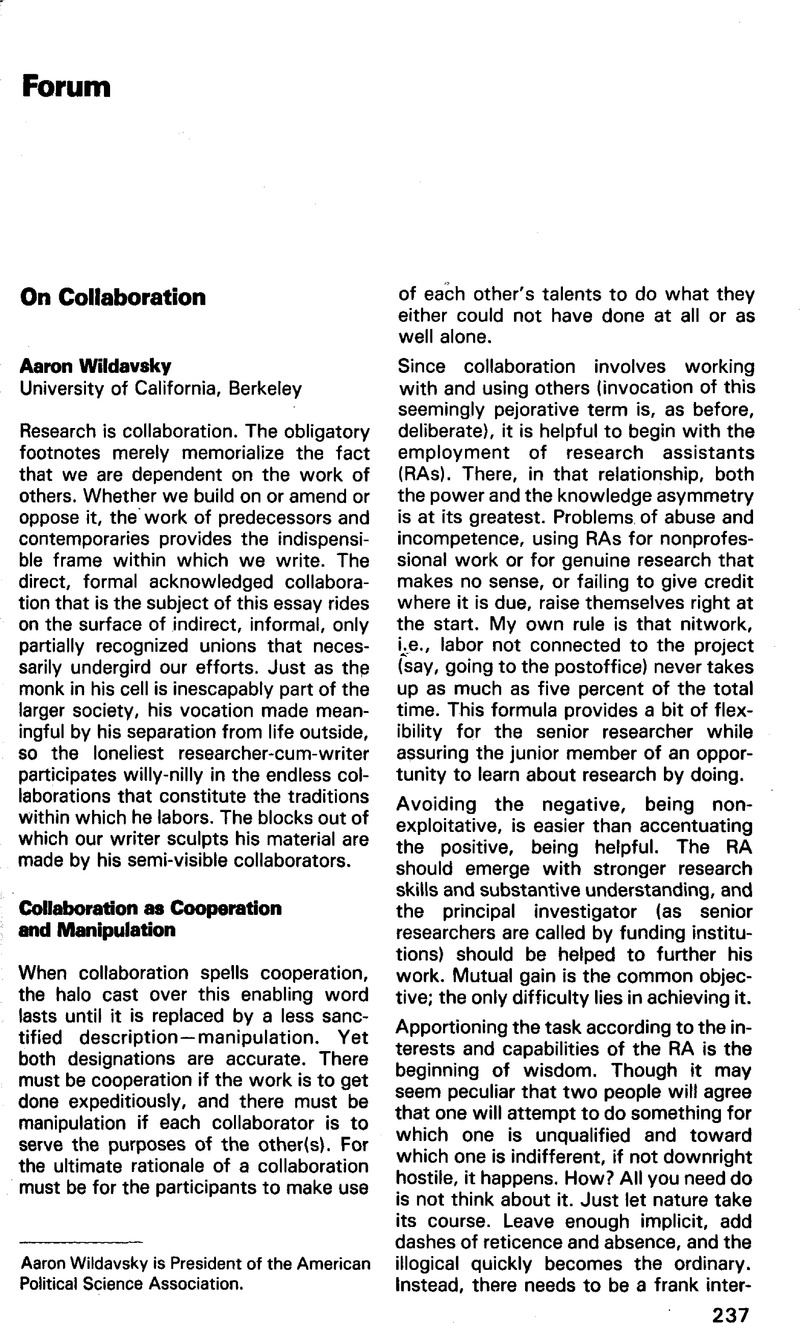Published online by Cambridge University Press: 21 November 2022

1 For a description and analysis of how this book was written, see my “Rationality in Writing: Linear and Curvilinear,” Journal of Public Policy, Vol. 1 (February 1981), pp. 125–40.
2 The Nursing Father: Moses as a Political Leader (Univ. of Alabama Press, 1984), and A History of Taxation and Expenditure in the Western World, with Webber, Carolyn (Simon & Schuster, forthcoming, 1986)Google Scholar are written from a cultural standpoint.
3 The Budgeting and Evaluation of Federal Recreation Programs (New York: Basic Books, 1973).
4 In The Future of Foundations (New Rochelle, NY: Change Magazine Press, 1978), pp. 10–41.
5 Knott, Jack and Wildavsky, Aaron, “Jimmy Carter's Theory of Governing,” The Wilson Quarterly, Winter 1977, pp. 49–67.Google Scholar
6 Implementation, 1st edition (Univ. of California Press, 1973.)
7 The Great Detente Disaster: Oil and the Decline of American Foreign Policy (Basic Books, 1975).
8 University of California Press, 1984.
9 The distinction comes from Lincoln Stefans who I recall writing in his autobiography about the difference between turn of the century reformers and politicians. When a woman's son has committed crimes galore, the boss from Boston explained, the reformers promise her justice but the machine provides help.
10 See my Speaking Truth to Power (Boston: Little, Brown, 1979), especially “The Self-Evaluating Organization.”
11 The Politics of Mistrust: Estimating American Oil and Gas Resources (Sage Publications, 1981).
12 “A Tax by Any Other Name: The Donor Directed Automatic Percentage Contribution Bonus, A Budget Alternative for Financing Government Support of Charity,” Policy Sciences, Vol. 7 (1976), pp. 251–79.
13 Published examples of our joint efforts are “A Cultural Theory of Information Bias in Organizations,” forthcoming in special issue of Journal of Management Studies, Geert Hofstede, editor; and “A Poverty of Distinction: From Economic Homogeneity to Cultural Heterogeneity in the Classification of Poor People,” to appear in Policy Sciences.
14 Commoner, Barry, The Closing Circle: Nature, Man and Technology (Bantam Books, 1971).Google Scholar
15 In Holling, C. S., ed., The Anatomy of Surprise (New York: Wiley Press, forthcoming).Google Scholar
16 Two early and two recent review essays may illustrate the possibilities I have in mind. See “The Political Economy of Efficiency: Cost-Benefit Analysis, Systems Analysis, and Program Budgeting,” Public Administration Review, Vol. 26, No. 4 (Dec. 1966): 292–310; “Practical Consequences of the Theoretical Study of Defense Policy,” Public Administration Review, Vol. 25, No. 1 (March 1965): 90–103; “Keeping Kosher: The Epistemology of Tax Expenditures,” Journal of Public Policy, Vol. 5, No. 3 (1986): pp. 413–31; and “The Grand Weeder: A Review of Jennifer Hochschild's The New American Dilemma: Liberal Democracy and School Desegregation, Constitutional Commentary (forthcoming).
17 See “Leadership as a Function of Regime,” an essay in honor of Vincent Ostrom, presented at the Bentley Chair Conference, Indiana University, May 1985; “Change in Political Culture,” Politics, Journal of the Australian Political Science Association (essays in honor of Henry Mayer, Vol. 20, No. 2 (November 1985), pp. 95–102.
To discover how a review essay on tax expenditure or a conference paper on foreign policy or a festschrift on federalism can be turned into an application of cultural theory, it is necessary to read those essays: “No War Without Dictatorship, No Peace without Democracy: Foreign Policy as Domestic Politics,” Social Philosophy & Policy, Vol. 3 (Autumn 1985), pp. 176–91; “Federalism Means Inequality” in Golembiewski, Robert and Wildavsky, Aaron, eds., The Costs of Federalism (Transaction, 1984), pp. 55–69.Google Scholar